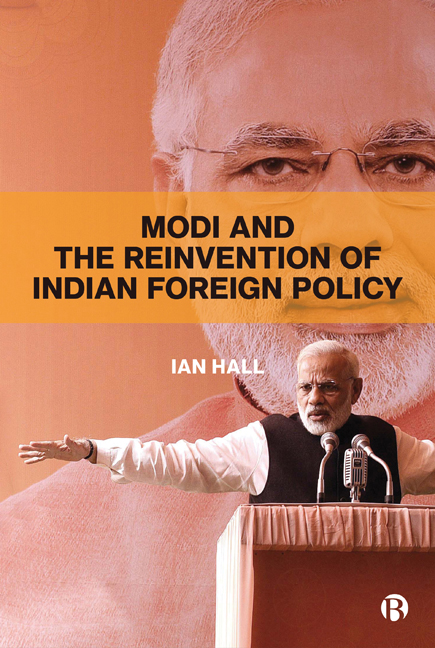Book contents
- Frontmatter
- Contents
- Abbreviations
- Glossary
- Notes on the Author
- Acknowledgements
- Preface
- 1 Introduction
- 2 Nonalignment to Multialignment
- 3 Hindu Nationalism and Foreign Policy
- 4 Modi and Moditva
- 5 World Guru India
- 6 Prosperity and Connectivity
- 7 National Power and Regional Security
- 8 Conclusion
- Notes
- References
- Index
3 - Hindu Nationalism and Foreign Policy
Published online by Cambridge University Press: 10 March 2021
- Frontmatter
- Contents
- Abbreviations
- Glossary
- Notes on the Author
- Acknowledgements
- Preface
- 1 Introduction
- 2 Nonalignment to Multialignment
- 3 Hindu Nationalism and Foreign Policy
- 4 Modi and Moditva
- 5 World Guru India
- 6 Prosperity and Connectivity
- 7 National Power and Regional Security
- 8 Conclusion
- Notes
- References
- Index
Summary
Hindu nationalists have a rich tradition of thought about politics and international relations running back into the mid-19th century, and of course they and others can make use of a range of ancient and medieval Hindu texts that address problems of statecraft. But in the main, Hindu nationalist thinking on foreign policy has long displayed considerable weaknesses. It is often imprecise and does not clearly align with the ways in which international relations are generally practised in the contemporary world, making it difficult to extrapolate clear lines of policy – especially in foreign affairs – from its assumptions and arguments. At the most fundamental level, it conceives of international relations in quite different terms to those with which most observers – at least in the West – are familiar. It sees the key players as civilisations or cultures, and not sovereign states. It often understands the sources of strength and vitality of cultures in racial and gendered terms. It invokes quite different remedies to the security challenges that we face to the ones most often countenanced, arguing that religious paths are the ones to take us beyond our current predicament. And it lambasts what it perceives as Westernised philosophies and practices – especially Nehru's – for its supposed failure to grasp the elements of an authentically Indian approach, as well as its inability to deliver to Bharat the greatness and recognition it deserves.
Modi's attempted reinvention of Indian foreign policy drew, as we shall see, on elements of this Hindu nationalist way of thinking. This is hardly surprising – as I discuss more in the next chapter, Modi knows this tradition well, as do some of his key lieutenants, like Ram Madhav or Sushma Swaraj, and as do many of their supporters, as they were introduced to it at an early age by the RSS or other organisations affiliated with it. As a result, their speeches are peppered with references to concepts, historical arguments and theories drawn from that tradition. I do not argue that Modi and allies tried to implement a foreign policy wholly consistent with the tradition after 2014 – the evidence does not support that conclusion. In significant places, their approach diverged at times from what we might regard as ‘orthodox’ Hindu nationalist thinking.
- Type
- Chapter
- Information
- Modi and the Reinvention of Indian Foreign Policy , pp. 41 - 60Publisher: Bristol University PressPrint publication year: 2019

